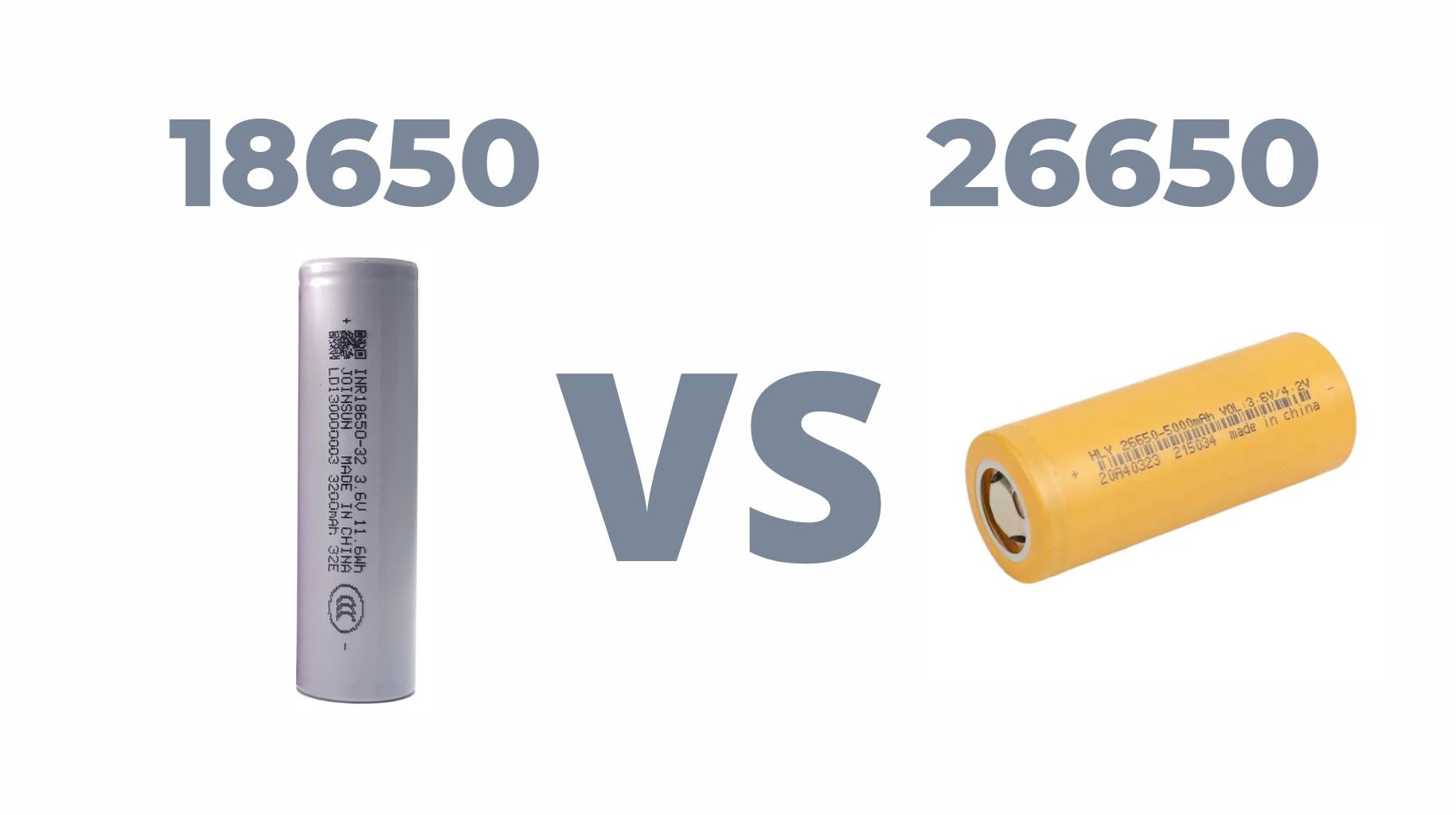When comparing the 18650 battery vs 26650, the primary differences lie in size, capacity, and application. The 18650 battery is smaller and widely used in laptops and flashlights, while the 26650 battery offers higher capacity, making it ideal for high-drain devices like electric vehicles and power tools.
Understanding Battery Specifications
Size and Dimensions
The most apparent difference between the 18650 battery vs 26650 is their physical size.
- 18650 Battery: Measures 18mm in diameter and 65mm in length.
- 26650 Battery: Measures 26mm in diameter and 65mm in length.
This size difference directly affects their capacity and applications.
Capacity and Performance
Capacity is measured in milliamp hours (mAh), which indicates how much energy a battery can store.
- 18650 Battery: Typically ranges from 1800mAh to 3500mAh.
- 26650 Battery: Generally ranges from 3000mAh to 6000mAh.
The higher capacity of the 26650 battery makes it suitable for devices requiring prolonged power, while the 18650 battery is more versatile for everyday gadgets.
Applications of Each Battery Type
Common Uses for 18650 Batteries
The 18650 battery is a popular choice for:
- Laptops: Powering portable computers due to its compact size.
- Flashlights: Providing reliable energy for high-lumen output.
- E-cigarettes: Used extensively in vaping devices for their manageable size.
Common Uses for 26650 Batteries
The larger 26650 battery is often found in:
- Electric Vehicles: Offering extended range and performance.
- Power Tools: Delivering high current for demanding applications.
- High-Power Flashlights: Ensuring longer run times at higher brightness levels.
Latest News
- Emerging Technologies in Battery Manufacturing: Recent advancements in lithium-ion technology are leading to improved performance metrics for both the 18650 and 26650 batteries.
- Sustainability Trends: Manufacturers are increasingly focusing on eco-friendly practices, reducing waste associated with battery production.
- Market Demand Shift: There’s a growing demand for high-capacity batteries, particularly the 26650 type, driven by the rise of electric vehicles and renewable energy storage solutions.
Redway Expert Comment
In our experience at Redway Power, the choice between the 18650 battery vs 26650 ultimately depends on your specific needs. While the compact size of the 18650 makes it versatile for everyday use, the superior capacity of the 26650 cannot be overlooked for high-drain applications. Our custom lithium LiFePO4 batteries cater to both categories, ensuring optimal performance tailored to your requirements.”
Comparative Analysis: Pros and Cons
Pros of 18650 Batteries
- Compact Size: Easily fits into smaller devices.
- Widely Available: Commonly used, making them easy to find.
- Versatile Applications: Suitable for various consumer electronics.
Cons of 18650 Batteries
- Lower Capacity: May not last as long under heavy use.
- Limited Power Output: Not ideal for high-drain devices.
Pros of 26650 Batteries
- Higher Capacity: Longer run time for power-hungry devices.
- Better Performance Under Load: Maintains voltage better during discharge.
Cons of 26650 Batteries
- Larger Size: Not suitable for compact devices.
- Less Common: May be harder to find compared to 18650 batteries.
Conclusion: Making an Informed Choice
In summary, choosing between the 18650 battery vs 26650 hinges on your specific application requirements. For everyday gadgets that require compact power sources, the 18650 battery remains a top choice. However, if you need a robust solution for high-drain applications like electric vehicles or power tools, the larger capacity of the 26650 battery will serve you better. Understanding these differences will empower you to make an informed decision tailored to your energy needs.
FAQs
What are the key differences between 18650 and 26650 batteries in terms of capacity and usage?
18650 batteries typically have a capacity range of 1800-3600mAh, while 26650 batteries offer higher capacities, usually between 3000-5000mAh. 18650 batteries are commonly used in smaller devices like laptops and flashlights, while 26650 batteries are preferred for high-power applications like power tools and e-bikes.
How do the dimensions of 18650 and 26650 batteries affect their applications?
18650 batteries have a smaller diameter (18mm) and length (65mm), making them suitable for compact devices. In contrast, 26650 batteries are larger (26mm diameter, 65mm length), offering higher capacity and power, ideal for devices requiring longer runtimes or more energy.
What are the main advantages of using 26650 batteries over 18650 batteries?
26650 batteries provide higher capacity and can deliver more power, making them ideal for energy-demanding applications. They also have better thermal stability and longer runtimes compared to 18650 batteries, which is advantageous in high-drain devices.
How does the discharge rate compare between 18650 and 26650 batteries?
26650 batteries generally have a higher discharge rate compared to 18650 batteries, meaning they can deliver more power at once, making them suitable for devices requiring bursts of energy. However, high-quality 18650 batteries can also offer impressive discharge rates, depending on the application.
What are the typical uses for 18650 batteries in everyday devices?
18650 batteries are commonly used in laptops, flashlights, portable power banks, and electric vehicles. Their compact size, high energy density, and reliable performance make them popular for devices requiring rechargeable and replaceable batteries.



